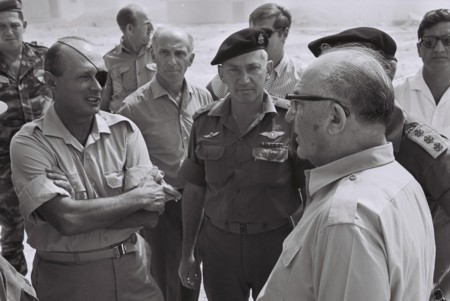|
Reviews of Recent Independent, Foreign, & Documentary Films in Theaters and DVD/Home Video
Directed by: Ilan Ziv. Produced by: Ina Fichman, Arik Bernstein and Luc Martin-Gousset. Written by: Stephen Phizicky. Director of Photography by: Andrei Khabad. Edited by: Alfonso Peccia & Benjamin Duffield. Music by: Vincent Stora. Released by: Seventh Art Releasing. Language: English, Arabic, Hebrew & Russian with English subtitles. Country of Origin: Israel/Canada/France. 105 mins. Not Rated. Narrated by: John Tarzwell. Six Days is an efficient History Channel-type day-by-day documentation of the 1967 war between Israel and its Arab neighbors. Its thesis: the roots of what The Daily Show sarcastically calls Mess O’Potamia come out of the nationalist passions this conflict let loose. Styled in an as-it-is-happening mode, direct participants or witnesses are interviewed, quoted, or their experiences reconstructed, described by political, military, and diplomatic observers, as well as pilots, soldiers, and front row journalists. The focus evenhandedly moves from Cairo to Tel Aviv, back and forth, with asides to Moscow, Washington, DC, Amman, Damascus, and the United Nations. The film intriguingly compares the precarious leadership positions of two men who couldn’t seem more different: Egypt’s hero of the people, President Gamal Abdel Nasser, and Israel’s cautious politician, Prime Minister Levi Eshkol, who at the start of the crisis also held the defense minister portfolio. Striking parallels are made of how their chess-like maneuvers were overwhelmed, first by faulty intelligence, then by public opinion enflamed by propaganda, and finally by aggressive military leaders, with unintended consequences that psychologically and physically shatter both men. Egypt’s blustery military chief Abdel Hakim Amer remains a bit mysterious, as are the explanations for the fictive but influential broadcasts of an Arab victory throughout the Mideast via Egyptian radio and television. In contrast, the distinctive personalities of the Israeli Chief of Staff Yitzhak Rabin and eventual Defense Minister-by-acclamation Moshe Dayan come across as critical to the war’s outcome. Particularly interesting are the interpretations of the step-by-step circumstances that led to the war, both Egypt’s saber rattling and Israel’s pre-emptive strikes, and then how the war quickly spread to Syria and Jordan (a long close-up of King Hussein’s face in defeat is more telling than repeated references to the death of a dream). Also revealing is the documentation of the war's conclusion in Jerusalem, with the Israelis’ emotional capture of the Old City and the West Bank overrunning any central policy planning. News and archival footage blend in a bit confusingly with black-and-white reconstructions. Sources of only occasional interviews and scenes are given, such as an Israeli television 20th year anniversary roundtable with the wartime military staff, a couple of home videos, and photographs taken by soldiers or civilians. To support the titular thesis, even briefer reference is made to the 1948 boundary decisions than the 1956 Suez Canal crisis as progenitors of the war. With the countdown of days before the war labeled ominously on screen, the narration frequently becomes too portentous. Eschewing Ken Burns’ intense photographic examination style, diarists’ words are preciously seen being typed and written while witnesses’ images are awkwardly zoomed-in on before they are identified.
Produced in cooperation with television networks in Australia, Canada, France, Israel, Italy and the US, an alternate version will air on PBS later
this year.
Nora Lee Mandel
|

